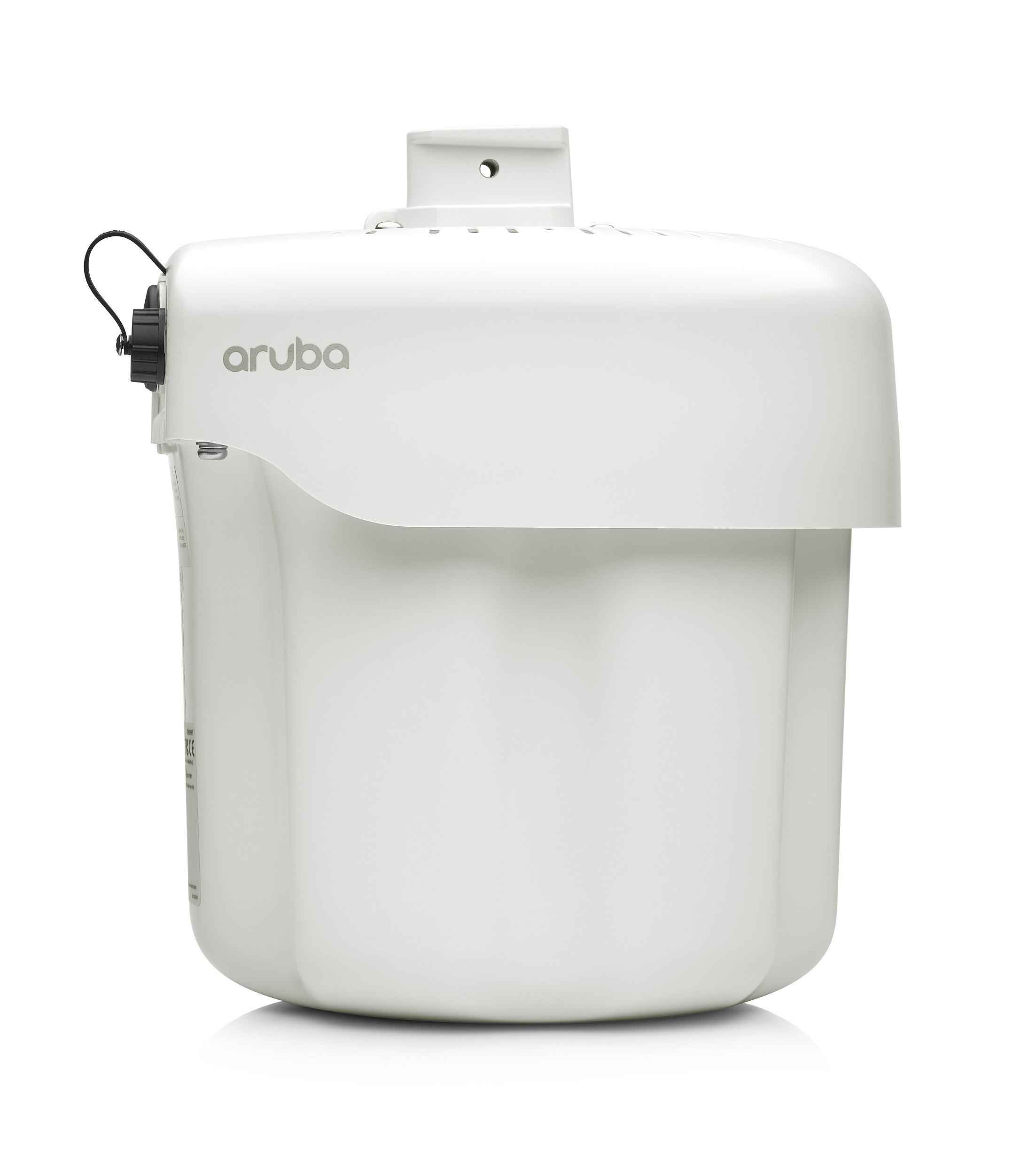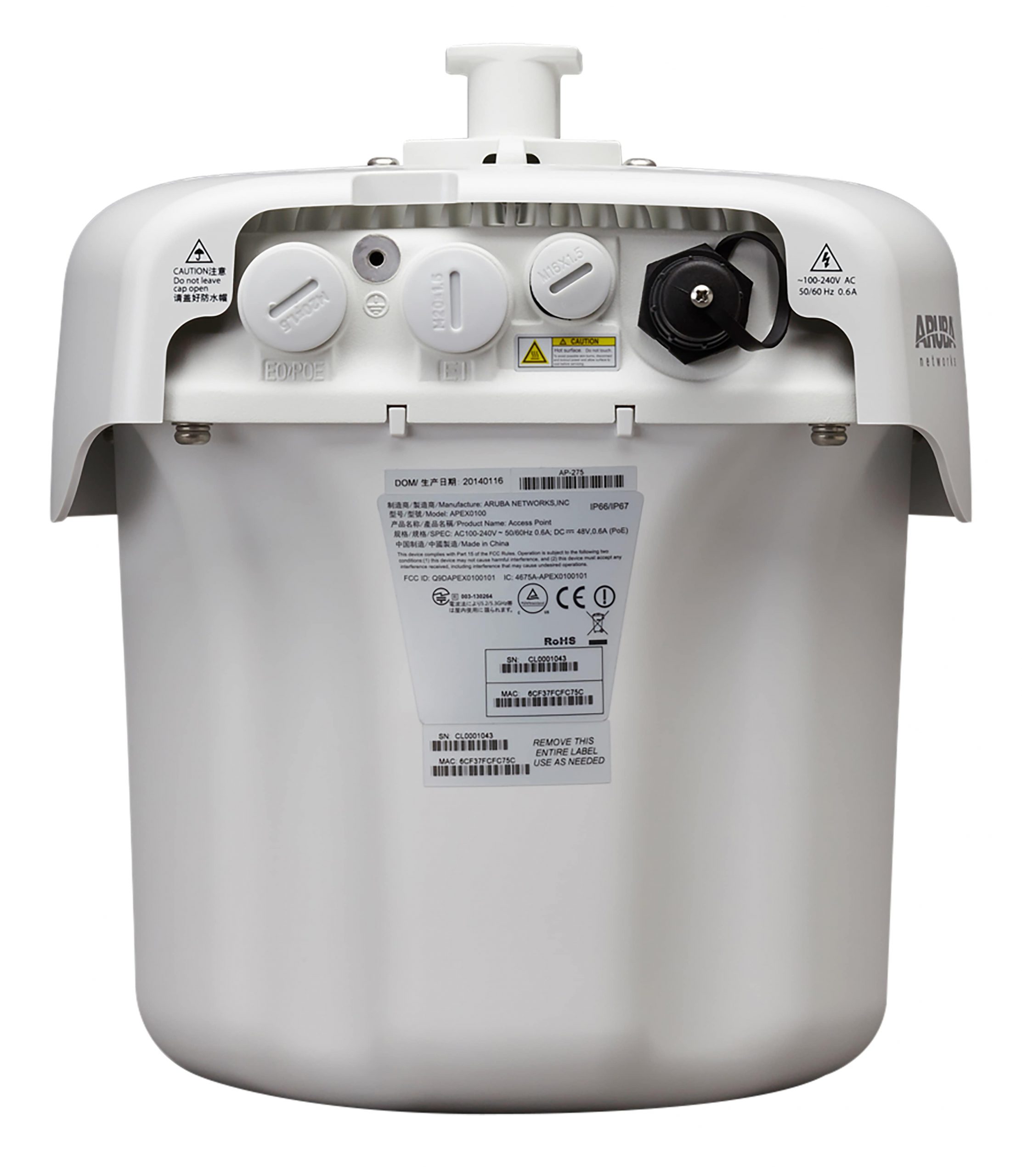Description
The Aruba AP-275 is an 802.11ac enabled access point designed to be installed in harsh outdoor environments to deliver high performance wireless networking under any weather conditions. The access point is fully sealed to keep out airborne contaminants, and is able to withstand extreme high and low temperatures, persistent moisture and precipitation. All of the electrical interfaces include industrial strength surge protection.
The AP-275 is capable of delivering a maximum data rate of up to 1,300 Mbps in the 5GHz band and up to 600 Mbps in the 2.4GHz band. Additionally, Aruba ClientMatch allows better client steering by gathering performance metrics to steer the client devices to the best AP and radio in real-time.
The AP-275 features an innovative industrial design that eliminates installation complexity, has an inconspicuous and aesthetic design, and delivers IP66 and IP67 rated protection. The AP contains a 2.4GHz and 5GHz radio, each with 3×3 MIMO and three integrated omni-directional antennas.
Specification
Antennas:
- Six integrated omni-directional antennas for 3×3 MIMO with a max antenna gain of 5 dBi. Built-in antennas are optimised for horizontal mounting of the AP-275.
Interfaces:
- One PoE+ PD Port 10/100/1000BASE-T Ethernet interface (RJ-45)
- One 10/100/1000BASE-T Ethernet interface (RJ-45)
- AC Power Interfaces (Power cords sold separate)
- Serial Console interface (micro USB)
- Reset Button
- Visual indicator (LED)
Mounting:
- Various optional mounting kits are available.
AP Type:
- Outdoor
- Dual Radio
Frequency Band:
- 2.4GHz
- 5GHz
Max Data Rates:
- 5GHz: Three spatial stream MIMO up to 1,300 Mbps to individual 3×3 VHT80 clients
- 2.4GHz: Three spatial stream MIMO up to 600 Mbps with 256-QAM and TurboQAM devices
Max Capacity:
- Supports up to 255 associated devices and up to 16 BSSIDs per radio
Supported Frequency Bands:
- 2.400 to 2.4835GHz
- 5.150 to 5.250GHz
- 5.250 to 5.350GHz
- 5.470 to 5.725GHz
- 5.725 to 5.850GHz
Supported Radio Technologies:
- 802.11b: DSSS
- 802.11a/g/n/ac: OFDM
- 802.11n/ac 3×3 MIMO with up to three spatial streams
Supported Modulation:
- 802.11b: BPSK, QPSK, CCK
- 802.11a/g/n: BPSK, QPSK, 16-QAM, 64-QAM, 256-QAM (with TurboQAM clients)
- 802.11ac: BPSK, QPSK, 16-QAM, 64-QAM, 256-QAM
Available Channels:
- Dependant on regulatory domain
Max Transmit Power:
- 2.4GHz: +23dBm per chain, +28dBm aggregate
- 5GHz: +23dBm per chain, +28dBm aggregate
Supported Data Rates:
- 802.11b: 1, 2, 5.5, 11
- 802.11a/g: 6, 9, 12 ,18, 24, 36, 48, 54
- 802.11n: 6.5 to 450 (MCS0 to MCS 23, 1 to 3 spatial streams)
- 802.11ac: 6.5 to 1,300 (MCS0 to MCS9,1 to 3 spatial streams)
Additional Features:
- Advance cellular coexistence (ACC)
- Maximum ratio combining (MRC)
- Cyclic delay diversity (CDD)
- Short guard interval for 20/40/80 MHz channels
- Space-time block coding (STBC)
- Low-density parity check (LDPC)
- Transmit beam-forming (TxBF)
- 802.11n high throughput (HT 20/40)
- 802.11ac very high throughput (VHT 20/40/80)
- 802.11n/ac packet aggregation (A-MPDU, A-MSDU)
- 1,116,000 hrs (127 years at +25C Operating Temperature) MTBF
Power:
- Direct AC Power at 100-240v
- Power over Ethernet (PoE) at 48v DC nominal, 802.3af/at
- Maximum Operating Consumption: 23W
Environmental:
- Operating Temperature: -40° C to +65° C (-40° F to +150° F)
- Operating Humidity: 5% to 95% non-condensing
- Storage Temperature: -40° C to +70° C (-40° F to +158° F)
- Operating Altitude: 3000m
- Chassis Rating: IP66/67
- Wind Speed: 165mph max
- Shock and Vibration: ETSI 300-19-2-4 spec T41.E 4M3
Regulatory:
- FCC/Industry of Canada
- CE Marked
- R&TTE Directive 1995/5/EC
- Low Voltage Directive 72/23/EEC
- EN 300 328
- EN 301 489
- EN 301 893
- UL/IEC/EN 60950
- EN 60601-1-1 and EN 60601-1-2
- CB Scheme Safety, cTUVus
- UL2043 plenum rating
- Wi-Fi Alliance (WFA) certified 802.11a/b/g/n/ac
- Regulatory Model Number: APEX0100


